One of our stops in China was in Chongqing, a city with a population of 6 million people. The city was spread out and we drove for miles in the city proper and everywhere we went there was either a road being built, an huge apartment or office building, or a major highway with megalithic like overpasses. 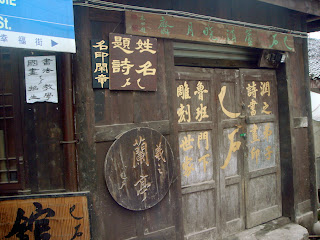
And then we were taken to an area of the city called the old street, Ci Qi Kou. This was how the old China must have looked years ago before the modern structures were built. The doors on all these old buildings were made of deep aged wood and the streets were all brick with major dips and gullies. It was a hilly part of Chongqing and from several locations we could look out onto the new section of the city, shrouded in an afternoon mist. 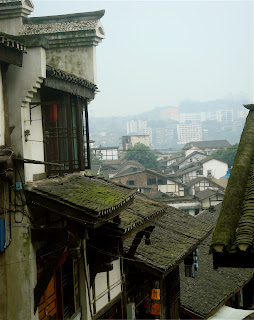
We walked along the streets that twisted and turned sometimes intersecting at right angles and other times a walkway would slip into the main drag, an alley with clothing hanging from power lines or discarded cardboard piled in a corner waiting for the garbage collectors to come along and clean the street. 
On one of these streets I came upon an old woman sitting infront of her house making soft sole shoes. She had a few items for sale scattered in front of her, items she had undoubtedly made herself. I bought a couple scains of bright red thread and one of her needles. But all along I had in mind that what I really wanted was to take a picture of this woman. I lifted my camer and she looked uncomfortable. So, I lowered the camera. But with the help of some young people who had been watching my transactions with the old lady I was told that what she wanted was money in exchange for her picture. I asked, “How much?” And they told me that she wanted twice what I’d paid for the thread, which really only amounted to a little over a dollar. I agreed and she then put her sewing down, sat up straight and posed for me. She is one of my most prized shots of that day.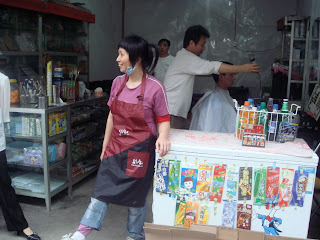
Ci Qi Kou was like nothing that I’d ever seen before. We passed a barber shop that also doubled as an ice cream store and variety store. The entire front was open to the public and we saw a man getting his hair cut while two women who might have been manacurists pulled down their masks and smiled and called to us as we walked by.
We saw a kitchen set up outside on the street and a few tables neatly arranged inside a darken room. All the stores and eateries had one wall open to the street. There were no light bulbs only natural lighting. Though we were only there during the day I can only imagine that there must be electricity in the area because there were rather rustic electric cables strung across the streets and into the house. 
Vendors walked the street with the classic poles balanced on either end with baskets containing fruit, vegetables and other items. We kept coming across a lemon vendor and she jokingly tried to sell us her lemons. But what would we have done with them? She smiled pleasantly and went on about her business.
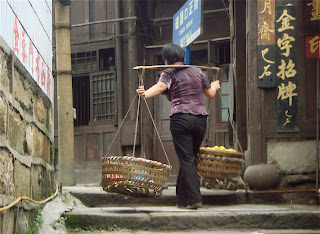
There were also vendors who had huge containers that appeared to be variety stores. Toys, candy, socks, and things that I had no idea what they were all packaged and neatly layed out for all to see. One vendor seemed to have been taking a break form the hustling of his busy day as he sat on a curb reading the local newspaper.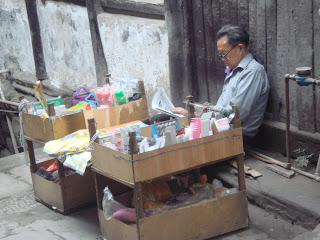
This little area of this huge and still growing city is like a museum with the Chinese culture and the old way of life on display. The items that are sold by the vendors, though modern and really quite western in nature, nevertheless, have become part of the replication of days gone by. The brick, the wood, the tile work possibly may be even older than the places where we boast about in the USA that ‘Washington slept here’. The interesting thing about this jaunt into Ci Qi Kou Street is that people still really live here. They may be scraping together a living, but this is their home and I wonder after looking at all the construction that is going on, not just in Chongqing, but in all of China, just how much longer this really special place will exist.
